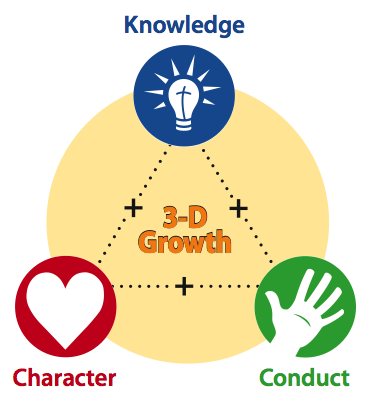 Discipleship is often labeled a “spiritual” activity. Nothing could be further from the truth! Jesus Christ showed His followers that discipleship encompasses every aspect of life. This article emphasizes the importance of balancing kids’ growth in three essential areas.
Discipleship is often labeled a “spiritual” activity. Nothing could be further from the truth! Jesus Christ showed His followers that discipleship encompasses every aspect of life. This article emphasizes the importance of balancing kids’ growth in three essential areas.
First Century Parenting
Just for fun, put yourself in the sandals of Joseph or Mary, Jesus’ earthly parents. While raising a child who never lied, never talked back, never undermined their authority, and always obeyed—what unique challenges did they face? A solitary verse summarizes Joseph and Mary’s parenting efforts: “And Jesus grew in wisdom and stature, and in favor with God and men” (Luke 2:52). However easy or difficult raising Jesus may have been, His parents achieved a remarkable balance with their remarkable Son. His formation progressed intellectually (wisdom), physically (stature), spiritually (favor with God), and relationally (favor with men).
Twenty-first Century Parenting
Now replace those first century sandals with your favorite 21st century footgear. Educators today use different terms (cognitive, affective, and sensory-motor) to identify ways that children develop. Cognitive = intellectual growth (knowledge), affective = emotional growth (character), and sensory-motor = physical growth (conduct).
Christian educators explore how these interdependent dimensions contribute to a person’s spiritual formation. Discipleship is the ongoing process whereby believers grow in Biblical knowledge, Christlike character, and faithful conduct—to the glory of God. Your goal in discipling your child to be like Jesus is to effectively interweave all three dimensions: knowledge + character + conduct.
- Knowledge: Kids develop a reservoir of knowledge based on a Biblical worldview.
- Character: Children display Christlike character in every area of life.
- Conduct: Students demonstrate faithful conduct that honors God and helps people.

Walking in Jesus’ steps and being His disciple is the Christian’s highest privilege! The Bible illumines a finite number of “must know” topics to understand (knowledge), “must be” traits to exhibit (character), and “must do” activities to experience (conduct). When a child’s development includes that knowledge, those traits, and those experiences, you can be reasonably assured that you have done your part to build a balanced, lifelong disciple of Jesus Christ.
Where do you start? Take a close look at your child. Children are inclined to favor either knowledge or character or conduct. One of those three dimensions is his or her area of natural strength. Each child also shows a reluctance or inability in one dimension.
Strengths have corresponding weaknesses. Balanced discipleship training encourages children to grow in areas of natural strength and to reinforce areas that are prone to weakness. What will happen if your child’s Bible knowledge, or Christian character, or faithful conduct is neglected?
Let’s find out: DOWNLOAD Balance Your Growth PDF (4.86mb)






No Responses